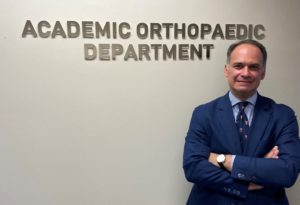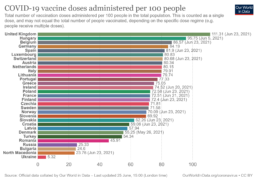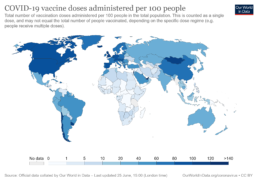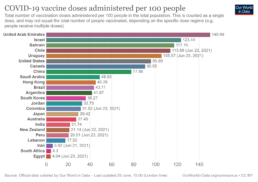EHS Secretary General, Professor Eleftherios Tsiridis

The highly infectious Delta variant of COVID-19 continues to spread throughout the world and Sydney in Australia is now under a 2-week lockdown. Meanwhile large global sporting events, from football to tennis and of course the Olympics in Tokyo, hope to continue with domestic spectators only and of course dramatically reduced numbers.
Please enjoy the excellent update from our EHS Member in the Russian Federation, Prof Rashid Tikhilov, who writes a Diary of an Orthopaedic Surgeon during the pandemic this month. Thank you very much to him.
Below is the update of the vaccination progress in our EHS member countries across the world, taken from Oxford University’s Our World in Data. Meanwhile, please do contact the EHS Secretarial Office via our Membership Secretary (samstokesehs@gmail.com) with reports on the COVID-19 developments in your area which you would like to share directly with our fellow hip surgeon members. Thank you.
The impact of COVID-19 on the delivery of Orthopaedic Surgery: a view from the Russian Federation, by Prof Rashid Tikhilov

Dear Colleagues!
It is a great honour for me to familiarize you with the situation in hip surgery in the context of the ongoing coronavirus pandemic in our country.
First of all, I’d like to note that the scenarios and decisions made in different regions of Russian Federation were different: it depended on the COVID-19 infection rate and local healthcare features in a particular part of our large country.
As for the region where I’m working, which is the Northwestern part of Russia, since March 2020, some hospitals have been redesigned for infectious diseases hospitals: elective surgeries were stopped, and in the rest emergency care was provided. As the incidence of new coronavirus infection decreased, starting from August-September 2020, we resumed elective orthopaedic surgery subject to strict adherence to the epidemiological regime, which included mandatory PCR testing of patients for the presence of new coronavirus infection and isolation of patients in separate wards until results were obtained.
The resulting shortage of beds had to be compensated for by reducing the length of hospital stay after surgery. Usually, after hip arthroplasty, the patient stays in the hospital for 7-9 days, which is due to the considerable distances in our country – the patient needs to get home from St. Petersburg sometimes several thousand kilometres away. 2020 forced us to speed up the discharge of patients by 2-4 days.
Taking this opportunity, we studied the effect of the changed terms of inpatient treatment on the risk of complications after arthroplasty and on the risk of in-hospital infection with a new coronavirus infection: the results of this work were published in the journal Traumatology and Orthopaedics of Russia. Fortunately, reduced hospital stays does not increase complication rate and readmission.
Another organizational feature, dictated by the requirements of regulators, is the discharge of patients in case of a positive test for a new coronavirus infection: at the same time, we are forced to discharge not only patients with a positive test, but also all patients in contact with him and temporarily close the department. This is a rather difficult measure: a patient who has been waiting for an operation for a long time needs to return home and come back after a while.
As a result, in 2020, the number of elective orthopaedic surgeries decreased by 25-30% from 2019, and even more in some hospitals that have been completely redesigned to treat the new coronavirus infection.
Starting from January 2021, we have been working in full scope of elective orthopaedic care; since May 2021, we have begun to hold small off-line conferences.
A new feature of the spring and summer of 2021 was a large-scale vaccination campaign: in some hospitals, a requirement is being introduced to vaccinate the patient in advance before elective orthopaedic surgery.
It is difficult to predict tomorrow, but we very much hope for the soonest restoration of normal face to face communication with Colleagues.
Health to you, your loved ones and patients.




